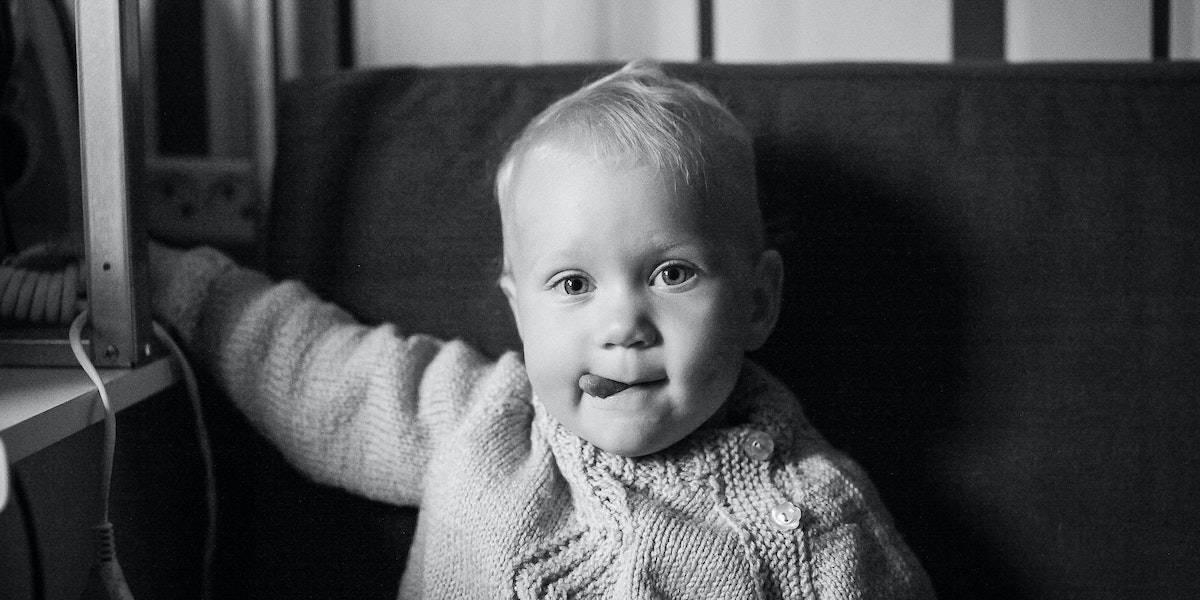Black tongue, according to NCBI, is not as common in babies as it is in adults. There are several reasons as to why children can develop a black tongue, also known as lingua villosa nigra, and although this can be unsettling to see, it is not always a cause for concern and can be resolved with or without treatment in some cases. Other possible causes include food staining, oral thrush, ulcers , niacin deficiency or allergies.
As an Amazon Associate, I earn from qualifying purchases. The links below may be affiliate links. Please read my disclosure policy for more information.
Causes of Black Tongue in Children
There are several causes of black tongues in children, some may be because of something medical, however there are several causes that are non-medical.
Food Staining
Your child may have consumed something dark in color, whether that’s drinking a fruity drink, food coloring or eaten something dark in color, for example blackberries.
Additionally, if your child is a newborn infant and breastfeeding, then it may be milk residue on their tongue. If you have reason to believe your child may have consumed dye or ink, please consult medical advice.
There are several medical causes of black tongue in children, which can be a result of illness or a possible side effect of medication.

How can Bacteria Grow on Baby’s Tongue?
Halitosis, also known as bad breath, happens when bacteria grows in the mouth because of sulfur compounds and this can cause discoloration of the tongue in children.
This is characterized by an unpleasant odor in the mouth and can be caused by poor dental hygiene, dry mouth, or other conditions such as acid reflux.
Black Tongue
A condition called black hairy tongue, also known as lingua villosa nigra, can occur when bacteria or yeast grows on the tongue.
This can appear like a black patch or patches of hair and are caused by yeast, and usually will resolve itself and disappear after a couple of weeks. This is also known as oral thrush.
What are the Signs of Oral Thrush?
Oral thrush is a buildup of bacteria located anywhere within your baby’s mouth. Babies can experience oral thrush because their immune systems are still at the early stages of their development, especially newborn babies.
Oral thrush isn’t the same as the black tongue. The black tongue is located only on the tongue.
If your baby has a black tongue, because of oral thrush, this will usually resolve on its own within a few days but you can still seek medical advice, where antifungal medication will usually be prescribed by a doctor.
If your child is being breast-fed, it’s advised both mom and child receive treatment, to prevent the spread of infection from the child to mom.
If your child’s symptoms persist after treatment, after seven days, it’s advised you seek further medical advice.

Ulcers or Cold Sores
Ulcers and cold sores are contagious diseases that affect the mouth, usually affecting older children. Although harmless in toddlers and above, it can be very dangerous for infants as their immune systems are still developing.
To effectively prevent infants from contracting ulcers or cold sores, it’s advised to avoid kissing them and ensure a high level of hygiene is practiced, for example washing hands, washing the baby’s belongings etc.
Seek medical advice if ulcers or cold sores are causing your child pain or discomfort.
Niacin Deficiency
A possible cause of spots on the tongue could be Niacin (Vitamin B3) deficiency, also known as pellagra, although this is very rare with modern diets.
Early symptoms of niacin deficiency include diarrhea and dermatitis as well as a later symptom of dementia.
Even in the case that your child has sufficient vitamin B3 in their diet, the deficiency can be a result of them not being able to absorb the vitamin into their body.
Seek medical advice if your child develops any of the early symptoms of Niacin (Vitamin B3) deficiency or for them to have a blood test to find out if they are Niacin deficient.
Allergies

A burning sensation on the tongue also known as strawberry tongue, can happen because of allergies, infections, or it could be an underlying illness.
An example of this may be an allergy or reaction to antibiotics or other medication, either way consult medical advice immediately if your child has a red or swollen tongue.
Teething
When your child begins teething, they may refuse solid foods and suffer with sore gums. This can also cause irritation.
If your child is experiencing bleeding gums, receding gums or both, this can be symptoms of gum disease. If your child is old enough, ensure that they have good dental hygiene, brushing their teeth and flossing twice a day.
If the symptoms persist, seek dental advice.
Pepto-Bismol
Another cause of black tongue in children, is the commonly occurring reaction to the medication Pepto-Bismol.
This over-the-counter medication is used to treat ulcers, indigestion, stomach complaints and diarrhea, and because of a component within the medication (bismuth) mixing with saliva, the tongue can turn black in color.
This is not a cause for concern if your child is over 12 years of age, the discoloration usually disappears after a couple of days of not taking the medication.
Research has found that an ingredient in Pepto-Bismol has been linked to Reye’s syndrome in children, which can cause several serious side effects and can be fatal.
Please seek medical advice if your child is under the age of 12 and has consumed Pepto-Bismol medication.
Possible Birthmark
If your child was born with a black tongue, this is not uncommon and could be a birthmark, also known as pigmented nevus. It could also be a part of your child’s pigmentation.
Geographic Tongue
Geographic tongue, also known as benign migratory glossitis, is a harmless inflammatory condition that affects the tongue. It appears as discoloration in spots, patches, or lesions on the tongue.
To differentiate between black tongue and geographic tongue, black tongue can appear as dark, black in color and can appear hairy, whereas geographic tongue can appear as white, red, yellow or pink in color and can look like a map due to patches appearing in island-like shapes on the tongue.
Geographic tongue hasn’t been found to be linked to any other health conditions, and its cause is still unknown. As geographic tongue is benign and resolves on its own, it doesn’t require treatment.
Seek further medical advice if your child is experiencing pain or discomfort, as a doctor can advise and prescribe topical treatments for symptom management.
Treatment for a Black Tongue
If your child’s black tongue is a result of something they eat or drank and the product wasn’t toxic, the black discoloration will usually disappear after a few days.
Clean Your Newborn’s Tongue
As infants don’t produce enough saliva to reduce milk residue on their tongue nor do they have food in their diet to scrape the residue off, as a result, this can cause a buildup of residue and appear dark on the tongue.
By cleaning your infant’s tongue daily, this can reduce residue buildup and prevent bacteria from growing on their tongue.
Ensure you wash your hands prior to cleaning their tongue, using a soft cloth dipped in lukewarm water (without any cleaning soaps or products), wrapped around your finger, and gently clean their tongue in a circular motion as well as their gums, cheeks and roof of their mouth.
Advice for Mothers – Take Care of Yourself
Aside from ensuring your hands are clean and so are the products you use for your baby, looking after yourself is important. If you breastfeed your child, ensure that you wash your nipples before and after feeding, this can prevent chances of oral thrush for you.
If you develop symptoms of oral thrush, seek medical advice. For further prevention, including probiotics in your diet can balance both you and your baby’s immune systems.
When to Call a Healthcare Provider

If your child has consumed a product that was toxic to them, you would need to consult medical advice.
If your child’s black tongue is a result of medication, ask their healthcare professional for alternative options for medication without the given side-effects.
Additionally, if your child isn’t experiencing any additional side effects, it’s recommended you seek the assistance of a dental professional.
If a medical professional concludes that your child’s black tongue is a result of an infection or thrush, the usual treatment would usually be antibiotic or antifungal medication.
If your child’s discoloration or fungus doesn’t clear after seven days, seek further medical advice.
Consult medical advice if your child is experiencing further symptoms such as
- Bleeding
- Swelling
- Discharge
- Pain when feeding or rejecting feeding
Seek emergency medical assistance if your child has a black tongue as well as symptoms such as:
- Sickness
- Stomach pain
- Fever
How to Prevent Oral Thrush in Babies?
Oral thrush in babies is said to be impossible to prevent. There are steps however, to reducing the chances with good hygiene when breastfeeding, as well as with bottles and toys etc.


